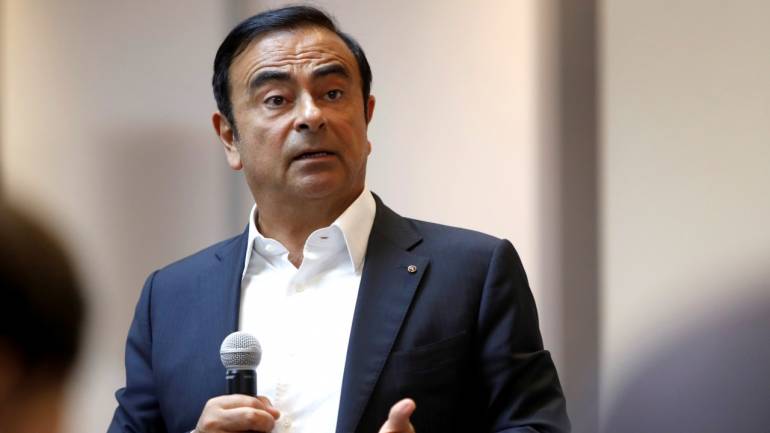
Japan urges Ghosn to return as fugitive tycoon defends escape

Japan’s justice minister on Thursday urged Carlos Ghosn to return and make his case in court, after the fugitive former auto tycoon gave an impassioned defence of his decision to jump bail and flee to Lebanon.
Ghosn made his first public appearance since his audacious December escape at a combative press conference in Beirut on Wednesday, where he slammed Japan and said he had been forced to flee because he would not get a fair trial.
The ex-chairman of Nissan-Renault faced four charges of financial misconduct in Japan, which he alleges were cooked up by disgruntled executives at Nissan in collusion with Japanese prosecutors.
On Thursday, Japanese Justice Minister Masako Mori called those claims “baseless” and insisted Ghosn’s “assertions will not justify his flight from Japan in any way.”
“If defendant Ghosn has anything to say on his criminal case, he should make his argument in a Japanese court and present concrete evidence,” she added.
“If he claims innocence, he should face a trial under the justice system in Japan, where he was doing business, and he should submit evidence to prove his claims,” Mori said.
The former car magnate spent much of his two-hour press conference insisting that justice was impossible for him in Japan.
He argued that the charges against him, including allegedly under-reporting his pay and skimming Nissan funds for his own personal use, were a bid to bring him down for political reasons.
“There was no way I was going to be treated fairly… this was not about justice,” he told reporters, responding to questions in English, Arabic, French and Portuguese.
Ghosn said he was “presumed guilty before the eyes of the world and subject to a system whose only objective is to coerce confessions, secure guilty pleas.”
Ghosn has argued since his shock November 2018 arrest that the case against him was a bid to block his plans to more closely integrate Nissan with its French partner Renault.
On Wednesday, he alleged extensive collusion between the Japanese automaker and prosecutors and said he was the victim of character assassination.
The Tokyo prosecutor’s office hit back late Wednesday, saying “Ghosn’s allegations completely ignore his own conduct.”
“His one-sided criticism of the Japanese justice system is totally unacceptable,” the prosecutor’s office said.
Former Nissan CEO Hiroto Saikawa, a one-time Ghosn protege who was forced to resign in the wake of the scandal, also hit out on Thursday.
Ghosn “fled because he was afraid of being found guilty,” Saikawa told reporters.
The 65-year-old businessman was out on bail in Tokyo when he launched his audacious escape plan, and said he decided to flee after his lawyers told him he could wait five years for a verdict.
He also accused prosecutors of imposing strict conditions on his contact with his wife Carole in a bid to “break” him. Prosecutors in Tokyo this week obtained an arrest warrant for Carole, who is also in Lebanon, alleging she lied to a Japanese court.
Ghosn refused to shed any further light on how he managed to slip past authorities and flee Japan at the end of December — an astonishing feat given his high-profile status and the restrictions he faced.
Under his bail terms, his passports were confiscated, his home monitored and his internet access limited to a computer at his lawyer’s office.
Despite that, he appears to have formulated an elaborate plan with security experts who smuggled him onto a private jet at an airport near Osaka, packed into an audio equipment case.
The plane whisked him to Istanbul, where he boarded a second private jet and continued to Lebanon, which does not have an extradition treaty with Japan.
Interpol has issued a “red notice” at Japan’s request, but it remains unclear how Tokyo can bring Ghosn back to the country to face trial.
He said on Wednesday he plans to take measures, including possibly challenging the Interpol notice, in a bid to clear his name, but would not be drawn on whether he planned to travel outside Lebanon.

